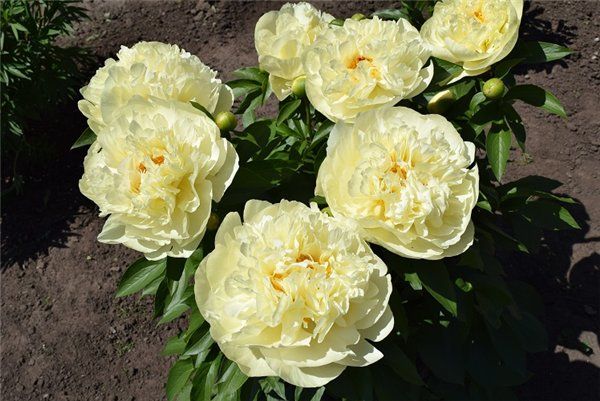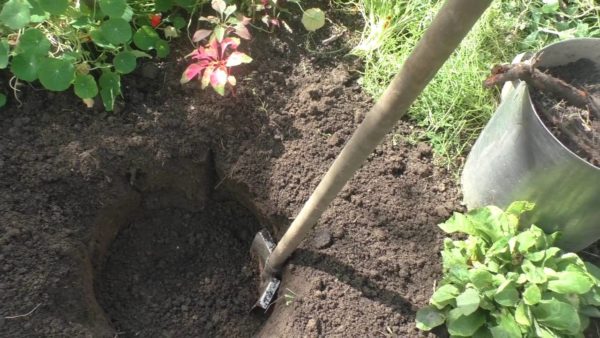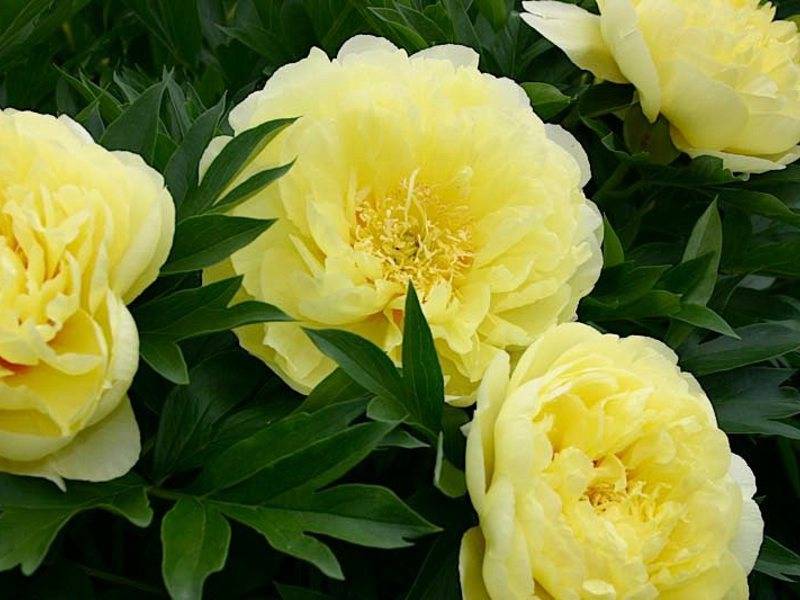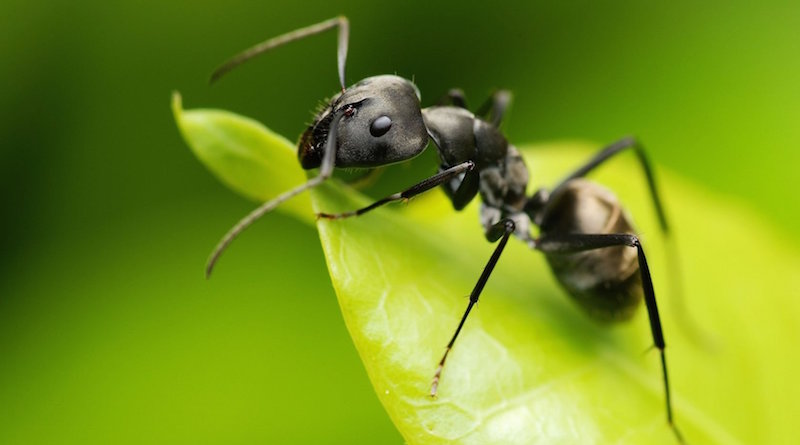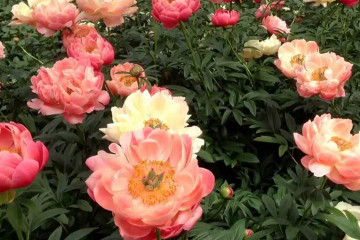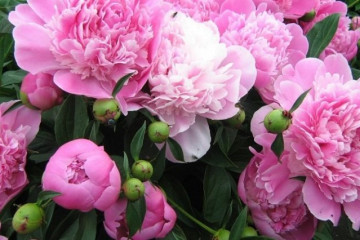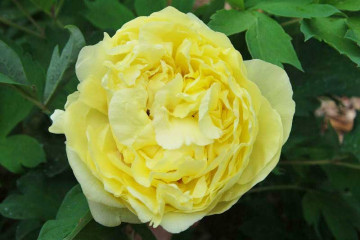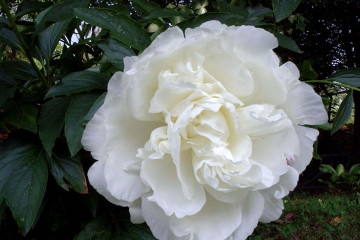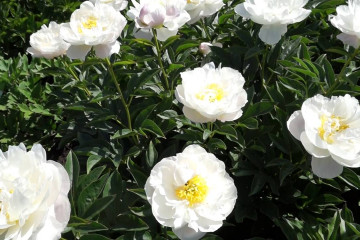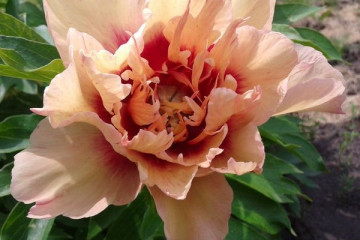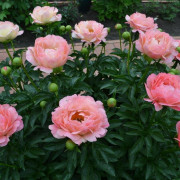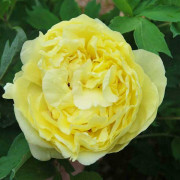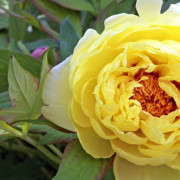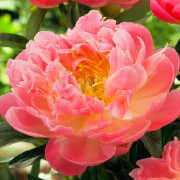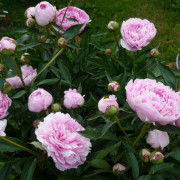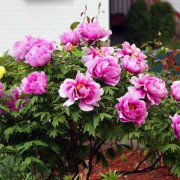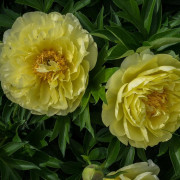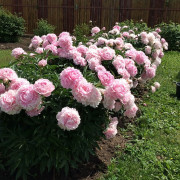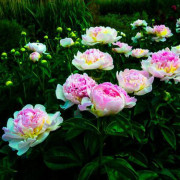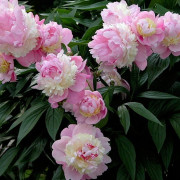Peony Lemon Chiffon (Paeonia Lemon Chiffon) - how to grow a flower
Content:
There are many varieties of peonies, which differ in the shade of the petals, the shape of the flower and the structure of the bush. The most common shades are white, pink and red. But there are also unusual colors that will not leave anyone indifferent. One of these varieties is the Lemon Chiffon peony.
Features of the lemon peony variety
Peony Lemon Chiffon is a relatively new variety. It was bred by Dutch breeders in 1981. This variety is distinguished not only by its beautiful flowering. The variety is resistant to low temperatures, diseases and pests.
Description
Peony Lemon Chiffon is a herbaceous perennial. The variety belongs to interspecific hybrids. It grows in the form of a compact bush no more than 80 cm high. The branches are tough and strong. In the presence of a large number of flowers, its rigid branches do not die even from strong winds.
The leaves of the plant are bright green and shiny. Young leaves are reddish. Semi-double flowers with a double center and creamy yellow petals. They have a faint and pleasant aroma.
Advantages and disadvantages
The main advantages of the variety are decorativeness, compactness and long flowering. The flowers are very large. They can have a diameter of 20 cm or more. Sturdy and tough stems withstand the weight of the flowers and retain the shape and beauty of the plant. Care and breeding are not difficult.
Peony Lemon Chiffon has no particular drawbacks. Requires a sunny color. Refuses to bloom in the shade. On young bushes, flowers with an insufficient number of petals can bloom. But over time, double flowers will appear in accordance with the varietal characteristics.
Variety in landscape design
The variety has an unusual flowering shade. Therefore, it is in great demand in landscape design. Looks great in group plantings, as it expands the color gamut.
Growing a flower, how to plant it in open ground
Growing a Peony Lemon Chiffon is easy. It is a very undemanding plant. There are the following breeding methods for the variety:
- root cuttings;
- green cuttings;
- layering.
The first method is the most popular.
Planting by root cuttings
Root cuttings are parts of the rhizome with growth points. Usually overgrown bushes of peonies are divided into parts. Each division contains at least 2 kidneys. Delenki can have developed shoots.
Peony cuttings are separated from an adult bush and planted in a pre-prepared planting pit. Plants grown in this way retain all the varietal characteristics of the mother bush.
Boarding time
Root cuttings of the paeonia Lemon Chiffon cultivar are separated and planted in the fall. This procedure is carried out after the end of flowering, but no later than mid-September.In this case, the cuttings can take root within 1-1.5 months before the onset of cold weather. For the winter, cuttings should be covered, since they have not yet adapted to the cold.
Location selection
Lemon Chiffon peonies love lit places. Open spaces suit them. They require direct sunlight for several hours a day. Only in such conditions will the plant bloom abundantly and annually.
You can plant peonies in light partial shade. Shady areas under large trees are not used. In the shade, the variety slows down development and does not bloom.
Preparing the soil and plants for planting
The preparation of the potting mix is very important for the proper development of the bush. Peony Lemon Chiffon requires a neutral or slightly alkaline soil.
For planting, make the soil of the following composition:
- garden soil;
- rotted manure;
- peat;
- sand.
All ingredients are taken in equal parts. Ash and sawdust are added to the finished mixture. The preparation of the planting material consists in processing the slices. All cuts on the rhizome are sprinkled with crushed activated carbon.
Planting procedure step by step
For planting peonies, a planting hole is dug. It must be at least 50 cm deep. The width depends on the size of the plant's root system. A wide pit is made for planting cuttings. After 2-3 years, the plants are planted in new places.
A drainage layer of broken brick, stones or expanded clay is laid at the bottom of the pit. A layer of sand is poured on top.
The pit is filled with soil mixture so that 10-12 cm remain to its top. After that, the planting pit is watered and cuttings are planted. Sprinkle everything on top with a layer of soil.
Seed propagation
Seeds can be harvested at the end of August. They are sown in a moistened soil mixture for peonies under a film. After emergence, the film is removed. Sprout care is carried out in a closed, heated room. After 2 years of age, the seedlings are planted in open ground.
Reproduction of peonies by seeds is a long and laborious process. But its main drawback is that the obtained specimens most often do not have the varietal characteristics of the parent plant.
Plant Care Lemon Chiffon
With easy care, the Lemon Chiffon peony will grow and develop correctly, which will ensure its long-term annual flowering.
Watering and feeding
This variety of peonies is not moisture-loving. Do not allow the soil to dry out, as this can lead to the death of the plant. The bushes are watered regularly, but not too abundantly. Do this when the top layer of earth under the bush has dried.
The variety does not need frequent feeding. They are fed in the spring with nitrogen fertilizers and at the beginning of autumn with potassium-phosphorus compositions. Overfeeding is not recommended as it damages the root system.
Mulching and loosening
Loosening of the soil should be carried out after each watering. The procedure is carried out carefully so as not to damage the roots. After watering, mulching the soil is not carried out.
Preventive treatment
Prevention of pests and infections is carried out in early spring. After the sprouts appear, the soil is spilled with a solution of potassium permanganate (2 g per bucket of water). After 7-10 days, the peonies are sprayed with Bordeaux liquid to protect against fungal infections.
Peony Blossom Lemon Chiffon
Lemon peonies are very decorative. Their flowers are large, have an unusual shade of petals and a light aroma. For long-term flowering, optimal care is required.
The growing season, flowering and dormancy
Peony begins to grow actively in early spring after the snow melts. The bush grows green mass before or until mid-May. Then the first buds appear.
Flowering of the Lemon Chiffon variety usually takes place in 2 stages. The first flowers appear in late May or early June. Flowering lasts about 30 days. The second flowering wave begins in early August and lasts until September. The dormant period begins in late autumn and continues until the onset of spring.
Care during and after flowering
During flowering, you need to increase the watering of the bushes. The soil surface should not dry out. Top dressing during flowering is not required for the Lemon Chiffon variety. The first feeding is carried out in the spring.
What to do if the peony does not bloom, possible reasons
The Lemon Chiffon variety blooms willingly. Usually there is no problem with this. But if the peony suddenly refused to bloom, the reason may be:
- growing in a shady place.
- the bush is too deeply planted;
- the age of the plant is considerable.
An old plant is considered to be several decades old.
Peonies after flowering
There are procedures for caring for peonies that are relevant for the flowering period. They are performed so that the bushes successfully overwinter and bloom the next year.
Transfer
The end of flowering is the time for a peony transplant. A transplant is necessary if:
- a peony has been growing in one place for more than 10 years;
- the bush has grown and formed many root cuttings;
- young plants need to be transplanted to a permanent place.
Peonies of the Lemon Chiffon variety grow rapidly. They can be divided as early as 3-4 years of age. From the moment of transplantation to the first frost, at least 1 month must pass for the plant to take root well.
Pruning
By winter, the ground part of the plant completely dies off. Dead foliage is cut and burned. This will prevent the spread of pests and diseases that may remain in the dead shoots of the plant.
Preparing for winter
Lemon Chiffon is frost-resistant. It can withstand temperatures as low as -40 ℃. It does not need shelter and grows well even in regions with a harsh climate. Only young plants are harbored during the first and second year of life. To do this, use sawdust and a special fabric - lutrasil.
Diseases, pests and ways to control them
Peonies Lemon Chiffon are resistant to various fungal viral infections. They practically do not get sick. With good care and preventive treatment, these plants do not cause problems for the grower.
Peonies of this variety are most often affected by:
- spider mites;
- ants.
Peony Lemon Chiffon is an irreplaceable variety for landscape design. It is good for decorating gardens and parks. Differs in long flowering. Cut flowers retain their freshness and aroma for a long time.
